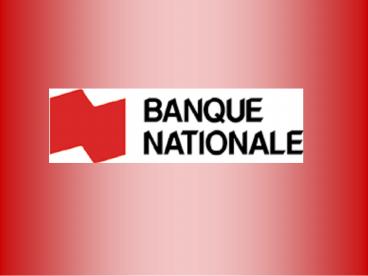UMCA Power Presentations - PowerPoint PPT Presentation
1 / 19
Title:
UMCA Power Presentations
Description:
I take full responsibility of the content in this presentation. ... Many challenges are associated with estimating appropriate 'haircuts' on assets. ... – PowerPoint PPT presentation
Number of Views:54
Avg rating:3.0/5.0
Title: UMCA Power Presentations
1
2
Risk Management at National Bank of Canada
- Presented by
- Alexander Marini
- For PRMIA Montreal Career Day
- October 2, 2008
- Concordia University
3
Disclaimer
- I take full responsibility of the content in this
presentation. The views and ideas presented here
are my own and not necessarily those of National
Bank of Canada.
4
Agenda
- What is the challenge of Risk Management?
- How is risk management organised at National Bank
of Canada? - What are the challenges of each risk group?
- A short history of market risk management
evolution. - Who are our clients?
- What skills are we looking for?
- Are you ready for the challenge?
5
What is the challenge ofRisk Management?
- To create and maintain an infrastructure that
facilitates the understanding and quantification
of the risks associated with past, present and
future activities. (at a reasonable cost) - The infrastructure needs to be flexible in order
to accommodate the introduction of new products
and evolve with changes of how we view risk. - The results of the risk management process must
be useful in business planning.
6
How is Risk Management Organized at NBC?
- National Bank of Canada groups its risks into
five broad categories Credit Risk, Market Risk,
Operational Risk, Reputation Risk and Liquidity
Risk. - Each group plays a fundamental role in
identifying, understanding and measuring risk (if
possible) over various time horizons and
confidence intervals. - National Bank is also active in understanding and
managing Model Risk.
7
Credit Risk Management Challenges
- One needs to understand and quantify the credit
worthiness of the Banks counterparties. This
involves many variables linked to factors such as
industry, geographic location, overall economic
conditions etc.. - Be able to measure the exposure to our
counterparties using a well defined methodology.
Try to understand and quantify the impact of
correlation between counterparty credit and the
underlying risk factors. - Allocate credit limits to lines of business and
manage the exposure to counterparties in
(hopefully) an optimal way.
8
Market Risk Management Challenges
- One needs to understand and quantify the types of
market risks that the Bank is exposed to such as
Interest rates, FX rates, Equity prices,
Commodity Prices, Credit Spreads, Volatilities
and Correlations. - The Bank needs to understand its exposure on an
individual portfolio and/or business level as
well as on an aggregate level. - The Bank needs to diversify its market risks in
an (hopefully) optimal way. - Question assumptions and perform stress testing.
9
Operational Risk Management Challenges
- To segregate operational risks into observable
components. - The collection of data to aid in the
understanding of the frequency and severity of
each operational risk type. - Development of models to aggregate across the
risk types and determine possible loss amounts. - Backtesting of the model for realistic time
horizons and confidence levels.
10
Reputation Risk Management
- Identify issues that may expose the Bank to
reputation risk. - Determine strategies to mitigate these
exposures. - Try to understand the time horizon, probability
and severity of events.
11
Liquidity Risk Management
- Know your balance sheet and assess the liquidity
of the products on a regular basis. - Identify and employ useful liquidity risk
measures (survival periods, unencumbered assets
) to quantify the risk. - Many challenges are associated with estimating
appropriate haircuts on assets. - Diversify the source of funding (secured and
unsecured) across products, maturity, geographic
regions and counterparties. - Quantify potential contigent liquidity.
(drawdowns of credit lines, NBC credit rating
downgrade)
12
A Short History of Market Risk Management
- 1938 - Frederick Macaulay introduces the idea of
duration. - 1970s - Duration and DV01 are being used to
measure interest rate risk. The idea of gaps is
already in use. - 1980s - Technology advances are helping improve
the detail in reporting DV01s by maturity,
currency, and Greeks reporting. - Till Guldimann introduces the term Value-at-Risk
while at J.P Morgan. - 1988 - Basle Accord
13
A Short History of Market Risk Management contd
- 1990s - Banks and software companies develop VaR
systems for market risk management. Banks can use
the internal model approach for regulatory
capital allocation. - 2000 and beyond Market Risk Management is
becoming more sophisticated. Systems must cover a
wide range of products and risk types. Time to
bring product to market is critical. A
convergence between Credit and Market Risk is
occurring. (Time horizon and confidence levels
are the distinction.)
14
Our Clients
- Bank Clients
- Board of Directors and Shareholders
- All departments of the Bank (Front Office, Back
Office, Accounting, Legal, etc) - Auditors
- Regulators
15
Skills that we are looking for
- Excellent team player. Ability to apply oneself
to both team and individual projects. - Enjoy serving clients.
- Good communication skills (oral and written).
- Knowledge and understanding of derivative
securities. Both pricing and risk
characteristics. - Good problem solving skills. Comfortable with
mathematical/quantitative concepts. - Curiosity. Enjoy to learn new things. Challenge
status quo. - Programming skills are a plus. (Useful for
prototyping)
16
Are you ready for a challenge?
- Key Requirement Must be able to count
correctly! - Are you sure you can count? Take a look at the
following puzzle
17
Before
18
After
19
- Questions?
- Please send your CV to celine.girouard_at_tres.bnc.ca
- Subject heading CV-85801































